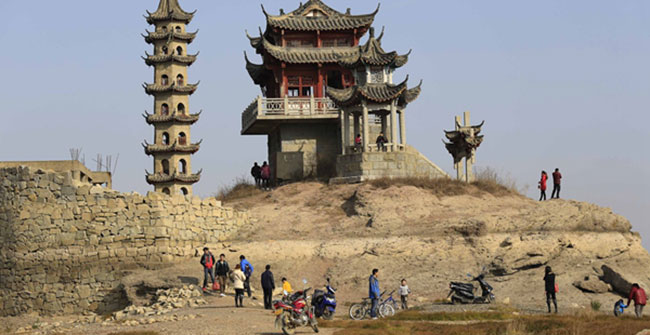'Extravagant' offices feel netizen's ire
(China Daily) Updated: 2012-09-05 07:45A township government in Central China is coming under fire for its new "extravagant" offices.
Built for the government of Minggang, a township administered by Xinyang city of Henan province, the offices have more than 8,000 square meters of floor space for about only 210 public servants and publicly funded institution workers, China News Service reported on Monday.
Local residents told China News Service that the township's Party chief and mayor each use a 200-sq-m office, and there is an elevator designated for their use only.
If the building had been constructed according to central government regulations, the total floor space should be no more than 2,100 sq m.
Regulations also stipulate that a minister or a provincial governor can use an office with a usable area of 54 sq m, while an official with the same level of the township's Party chief and mayor should use an office with a usable area of 9 sq m.
The well-decorated 10-story building also has a large exquisitely designed and maintained square in front, said the report.
It cost the township government more than 30 million yuan ($4.7 million), an official surnamed Zheng with the township government who was in charge of the construction told China News Service.
That amount is a large portion of the township's fiscal revenue, which was 53.3 million yuan in 2009 and 82.6 million yuan in 2011, according to the website of the Pingqiao district, which governs Minggang township.
Zheng said Xinyang city's development and reform commission approved the construction of the new office building.
"(Considering) the current offices of Minggang township are old and ramshackle and have created safety risks, the commission approves your feasibility research report (on the construction of a new building)," read a document from the commission.
"The total floor space should be less then 6,464 sq m and the total investment should not exceed 9.6 million yuan," it added.
Zheng did not disclose when the building's construction started or finished, according to the report.
"We haven't received any complaints about the office building," an official in charge of reviewing construction plans at the city's development and reform commission, who only identified himself as Wang, told China Daily on Tuesday.
"Normally, government departments make plans for office buildings based on the number of their staff, and we will examine them, and make some changes if necessary, according to national or provincial regulations," he said.
Higher authorities, such as his commission, usually do not inspect whether the construction complies with the regulations or not after a building is finished.
"There are seven people including me working in my office," said an official of the township government who declined to give his name. "And yes, our new offices are actually bright and spacious."
"And I have not heard any bad words about the building from the residents. Every evening when I walk through the square in front of the building, I see people enjoying time on the square, so you can't simply call it a waste of money."
However, many netizens said local governments should pay more attention to improving people's lives and important matters such as education and healthcare, rather than rack their brains to find excuses to update office buildings.
"When you want to erect a palatial office building, please take a look at those children who cannot even afford a humble meal," said a netizen with the online name quanshiuuu on Sohu, one of China's major news websites.
As of late Tuesday, more than 17,000 netizens have taken part in a discussion on Sohu, leaving more than 2,300 comments.
zhaolei@chinadaily.com.cn
- HK chief executive condemns riot, supports police to restore order
- Hong Kong overnight riot injures at least 48 police officers
- Special troops to help keep China-Pakistan corridor safe
- New policies to aid Belt and Road business ventures
- Zika curbs to include mosquito mass extermination
- Xi visits old revolutionary base areas ahead of Spring Festival
- Nation in bid to ward off the Zika virus
- Li drops in for a chat at historic mosque
- Prison time reduced after 11 show they regret crimes
- PLA vows support, contributions to military reform







